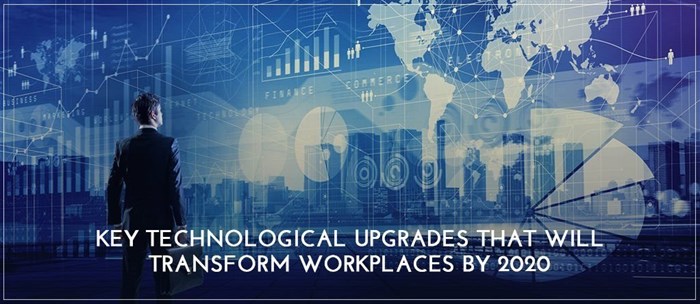Tech upgrades that will transform workplaces by 2020
With the competition in the market going haywire and the pace of development galloping at full speed, it’s only natural that a ‘digital revolution’ makes its way into the heart of the organisational sector as well.

So, the main question becomes: By 2020 what sort of technological upgrades can you expect to see in places where human labour thrives the best?
Decentralisation and the virtual move
Extreme flexibility in workplace policies is something we’ll probably witness in the upcoming era, even though its reverberations are already being felt. Today, millennial employees, especially those belonging to highly progressive firms, are empowered enough to work on their own terms, from any place and at any time.
According to a study by Owl Labs, this freedom has made the mobile labour force 24% more productive than their desk-bound contemporaries. Such a rapid decentralisation of a workplace unit is figured as a natural outcome of the ongoing technological developments, such as cloud computing and VoIP, etc. which are currently being incorporated in organisational setups.
So, by next year, you can expect to find a greater movement towards work-spaces powered by a ‘distributed’ work-force and:
- Remote Networking – The internet and internet-enabled wireless devices, such as smartphones, tablets, laptops, and whatnot, have made it easier for employees to work around the clock without being restricted to a centralised office space.
Now, they can remotely connect to the organisation’s private cloud network and accomplish their tasks on the virtual plane. Once this practice catches on and the networking technology becomes more refined, you will find pop-up workplaces wherever you go in distant times.
- Virtual Collaboration – With the help of advanced digital tools and smart VoIP systems, such as Skype, Wrike, Trello, and Asana, etc., employees can push the boundaries of collaboration from a ‘limited physicality’ (bound by time/space) to an ‘unlimited virtuality’ (unbound by time/space).Meaning, you can work on a project together with your teammates in real-time without facing an efficiency lag of any sort. The only prerequisites are that you have a reliable internet connection from a top-performing provider in your area, and safe online access to a cloud-based dashboard or some such collaborative platform where you can get together, become the visionaries behind your organisation’s success, and be recognised throughout the corporate circles for it. That’s what a 2020 workplace will look like – a tight-knit virtual network with an ideal ratio of transparency and accountability.
Full on AI deployment
Artificial Intelligence, in the form of Alexa and Siri, has made its way into our homes and into our hearts quite cleverly. There are literally hundreds of tasks - from fetching information to operating smart home devices - which we ‘delegate’ to these intelligent mechanisms on a daily basis.
This is just the beginning. Imagine what their inculcation in general workplaces will do for human society as a whole. According to Gartner’s 2019 CIO Survey, 37% of business organisations have already implemented AI in some form throughout their structures, and interestingly, this adoption has tripled in the past twelve months. Given the speed with which this trend is becoming popular, you’ll surely find AI fully automating workplaces in the near future.

For now, the following three major AI x Corporate waves can be discerned clearly:
- Process Management via AI Robots – Artificial Intelligence is basically a machine-based semblance of human cognition, i.e. a computer system which can think, learn and self-correct as a human does. With such an advanced technology implemented throughout business organisations, operational efficiency and process management are expected to be streamlined to a great extent.
In the coming years, you can hope to find smart AI robots digitising and automating monotonous tasks in a workplace, such as maintaining customer records, updating inventories and retrieving lost data, etc., thereby, giving creative space to the human workforce for further innovation.
- Predictive Insights via Machine Learning – Scanning through a vast immensity of data to locate patterns and predict future moves not only takes a ridiculously huge amount of time but is also a highly exhaustive process.
Luckily, a branch of Artificial Intelligence i.e. Machine Learning can help solve this issue and boost productivity in the workplace. ML is a smart AI algorithm that analyses data, learns the inherent patterns and makes decisions with minimal human intervention.
Such a mechanism will bring about more personalised targeting, better security and higher profit ratio for the workplace, minus the drudgery, that is.
- Communicative Capabilities via Chatbots – The ideal workplace of 2020 is said to be supported by automated assistants - intelligent AI agents, which will engage with human consumers, redirect client calls and answer user queries as they do now, in addition to recommending services via a more personalised funnel, without any sort of human intervention. It seems that we will see more of chatbots (artificial programs that mimic human behaviour and conversation) in the coming year as well.According to Innovation Enterprise, about 80% of all customer service will be powered by AI chatbots by 2020.
Thus, as you can see, the inculcation of the aforementioned technological upgrades is sure to transform the traditional workplace that you and I know into something more digitally revolutionised in the coming years.
Let’s just hang tight in the meanwhile.
























